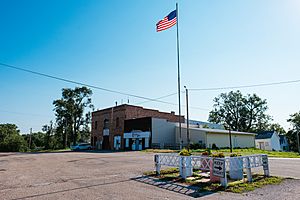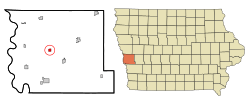Magnolia, Iowa facts for kids
Quick facts for kids
Magnolia, Iowa
|
|
|---|---|
 |
|

Location of Magnolia, Iowa
|
|
| Country | |
| State | |
| County | Harrison |
| Township | Magnolia |
| Area | |
| • Total | 0.55 sq mi (1.42 km2) |
| • Land | 0.55 sq mi (1.42 km2) |
| • Water | 0.00 sq mi (0.00 km2) |
| Elevation | 1,276 ft (389 m) |
| Population
(2020)
|
|
| • Total | 190 |
| • Density | 346.74/sq mi (133.88/km2) |
| Time zone | UTC-6 (Central (CST)) |
| • Summer (DST) | UTC-5 (CDT) |
| ZIP code |
51550
|
| Area code(s) | 712 |
| FIPS code | 19-48495 |
| GNIS feature ID | 2395814 |
Magnolia is a small city in Harrison County, Iowa, United States. In 2020, about 190 people lived there.
Contents
History of Magnolia
Harrison County was created in 1851. It officially started on March 7, 1853. Three people named Abram Fletcher, Charles Wolcott, and A. D. Jones were chosen to set up the county. They also picked the spot for Magnolia and gave it its name.
Magnolia was once the "county seat." This means it was the main town where the county government was located. A building used as the county courthouse was built in 1873. This building was listed on the National Register of Historic Places. Sadly, it was taken down in 2019 because it was in very bad shape and there wasn't enough money to fix it.
In 1875, the county seat was moved from Magnolia to a different town called Logan.
Geography of Magnolia
Magnolia is located in Iowa. The United States Census Bureau says that the city covers a total area of about 0.57 square miles (1.42 square kilometers). All of this area is land, with no water.
Population and People
| Historical populations | ||
|---|---|---|
| Year | Pop. | ±% |
| 1880 | 194 | — |
| 1910 | 311 | +60.3% |
| 1920 | 299 | −3.9% |
| 1930 | 271 | −9.4% |
| 1940 | 242 | −10.7% |
| 1950 | 207 | −14.5% |
| 1960 | 215 | +3.9% |
| 1970 | 206 | −4.2% |
| 1980 | 207 | +0.5% |
| 1990 | 204 | −1.4% |
| 2000 | 200 | −2.0% |
| 2010 | 183 | −8.5% |
| 2020 | 190 | +3.8% |
| Source: and Iowa Data Center Source: |
||
2020 Population Details
In 2020, the census counted 190 people living in Magnolia. There were 76 households and 54 families. A household is a group of people living in one home.
About 32.9% of the households had children under 18 living with them. The average age of people in the city was 43.8 years. About 26.3% of the people were under 20 years old.
2010 Population Details
Back in 2010, the census showed 183 people lived in the city. There were 79 households and 50 families.
The average age of people in Magnolia was 47.7 years. About 15.3% of the residents were under 18 years old.
Education
The local public schools in Magnolia are part of the Logan–Magnolia Community School District.
See also
 In Spanish: Magnolia (Iowa) para niños
In Spanish: Magnolia (Iowa) para niños
 | Isaac Myers |
 | D. Hamilton Jackson |
 | A. Philip Randolph |



